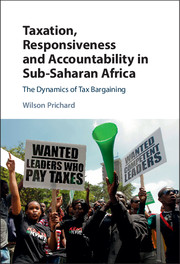By Wilson Prichard
It is increasingly argued that bargaining between citizens and governments over tax collection can provide a foundation for the development of responsive and accountable governance in developing countries. However, while intuitively attractive, surprisingly little research has captured the reality and complexity of this relationship in practice. This book provides the most complete treatment of the connections between taxation and accountability in developing countries, providing both new evidence and an invaluable starting point for future research. Drawing on cross-country econometric evidence and detailed case studies from Ghana, Kenya and Ethiopia, Wilson Prichard shows that reliance on taxation has, in fact, increased responsiveness and accountability by expanding the political power wielded by taxpayers. Critically, however, processes of tax bargaining have been highly varied, frequently long term and contextually contingent. Capturing this diversity provides novel insight into politics in developing countries and how tax reform can be designed to encourage broader governance gains. This book:
- Addresses a fundamental question in political science, at a relatively broad level
- Combines cross-country quantitative data with detailed qualitative accounts at the country level
- Links important theoretical questions in political science to clear country-level narratives and policy implications.
About the Author
Wilson Prichard is an Assistant Professor in the Department of Political Science and Munk School of Global Affairs at the University of Toronto, Research Fellow at the Institute of Development Studies, UK, and Research Director of the International Centre for Tax and Development. He works closely with national governments, civil society groups and international organisations on strategies to strengthen tax reform and encourage state-society tax bargaining and the expansion of accountability.
